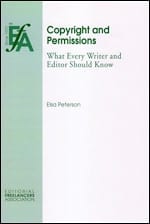When multiple authors collaborate to write a journal article, the task of determining authorship order inevitably arises. In some situations,…
Insights on working with editors: An interview with Elsa Peterson
 Elsa Peterson has more than 20 years of experience in textbook and academic publishing as a freelance permissions editor, picture researcher, and developmental editor. Her most recent in-house position was as a senior developmental editor for psychology with McGraw-Hill Higher Education. Peterson recently authored a brief and accessible guide to copyright in the context of publishing titled Copyright and Permissions: What Every Writer and Editor Should Know (New York: Editorial Freelancers Association, 2012). She has also authored numerous articles about the business and craft of editing, and has presented TAA audio conferences on editing and copyright.
Elsa Peterson has more than 20 years of experience in textbook and academic publishing as a freelance permissions editor, picture researcher, and developmental editor. Her most recent in-house position was as a senior developmental editor for psychology with McGraw-Hill Higher Education. Peterson recently authored a brief and accessible guide to copyright in the context of publishing titled Copyright and Permissions: What Every Writer and Editor Should Know (New York: Editorial Freelancers Association, 2012). She has also authored numerous articles about the business and craft of editing, and has presented TAA audio conferences on editing and copyright.
How to use social media as an academic writer
Social media has become an influential force in both our personal and professional lives. According to Mark Carrigan, social media trainer and sociologist at the University of Warwick, social media offers many benefits for academic writers. In a recent TAA webinar entitled, ‘What On Earth Will I Tweet About?’: Feeling Comfortable with Social Media as an Academic, Carrigan shared some of those benefits.
“One advantage of social media for academic writers is that it allows you to have an independent presence online so if you switch institutions, you can still easily be found,” Carrigan said. Since many academics work at multiple educational institutions during their careers, an independent online presence can be an invaluable networking and promotional tool.
How to write readable academic prose
The purpose of writing is to transmit ideas, says Andrew Johnson, professor of Holistic Education at Minnesota State University, Mankato, not to show the reader how much you know about a particular subject. “I approach articles and books as if the reader knows nothing,” he said. “I enter a teaching mode, trying to make things as simple as possible. I have to bring my ideas to the reader. I’m not famous enough for the reader to come to me.”
How to turn a seminar paper into a publication
The Director of Graduate Studies for your department has made noises about “the professional turn,” namely, writing for publication and not merely to demonstrate to the professor what you know. While you had a vague idea of what was meant, this is the first indication you have that you may be in the turn. What do you do now?
Your first stop is a meeting with your professor. Ask where it is likely to be publishable. And ask what else needs to be done to the paper to make it able to pass review.
How to deal with rejection in academic publishing
Rejection can certainly be discouraging, but it doesn’t have to mean the end of a project. It is important to move forward after your work is rejected and there are some steps you can take to avoid rejection altogether.
Overcoming disappointment is often one of the first things an academic author must face after a rejection. Dannielle Joy Davis, an Associate Professor of Educational Leadership, Policy, and Law at Alabama State University and a new co-editor for the journal Learning for Democracy, recommends setting aside a finite amount of time to feel disappointed before moving on and taking steps to resubmit. “I always send [a rejected paper] back out to a refereed venue and do not dwell on disappointment for more than 24 hours,” she said.





